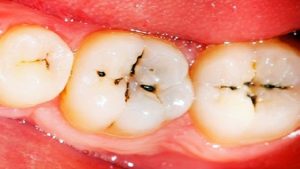 Cavities, or dental caries as they are known among dentists, are one of the most common dental problems in the world today for both children and adults alike. Most people know what they are, but did you know that cavities actually have 5 distinct stages? People tend to think that you either have a cavity or you don’t, and while that is partially true, understanding the different stages could help you (and your dentist in Ponte Vedra Beach) catch a small dental problem and stop it from ever becoming a big one.
Cavities, or dental caries as they are known among dentists, are one of the most common dental problems in the world today for both children and adults alike. Most people know what they are, but did you know that cavities actually have 5 distinct stages? People tend to think that you either have a cavity or you don’t, and while that is partially true, understanding the different stages could help you (and your dentist in Ponte Vedra Beach) catch a small dental problem and stop it from ever becoming a big one.
Stage 1: White Spots
When a tooth begins to show the signs of strain from the attack of sugars and acids in the mouth, the first thing you will begin to notice are bright white spots. This is the result of demineralization, which means the minerals that actually make up your enamel are just beginning to break down. These can be easy to miss, especially when they are on the back teeth. At this point, it’s very easy for a dentist to repair a tooth without needing an involved procedure, so if you spot them, be sure to contact your dentist right away!
Stage 2: Dark Spots
A dark brown spot on the teeth means that the enamel has become completely eroded. Enamel actually breaks down from the underside outward, so while it will remain intact at the beginning of this stage, it will eventually break down. At this point, the cavity should be easily visible and will require a filling to fix.
Stage 3: Dentin Decay
Dentin is the bony substance directly underneath your enamel, and it actually has many microscopic tubes that lead directly to the nerve of the tooth. Once a cavity has reached the dentin, a person will likely start to feel some kind of dental pain. A filling can still be used to repair the tooth, but it needs to be done quickly before the cavity can infect the dental pulp.
Stage 4: Pulp Infection
The dental pulp is the innermost portion of the tooth that houses a multitude of blood vessels as well as the tooth’s central nerve. When the pulp becomes infected due to a cavity, a patient will probably experience severe dental pain. The only way to address this issue is with a root canal that actually removes the infected pulp, or the tooth may need to be extracted completely.
Stage 5: Abscess
This refers to when the infection caused by the cavity has actually moved beyond the tooth into the surrounding gums and bone. At this stage, a patient will experience quite a bit of dental pain as well as swelling around the tooth. Left completely untreated, an abscess can actually prove fatal if not dealt with immediately. A root canal or extraction can be used to fix this issue.
How to Prevent Cavities
While this paints a pretty dire picture, cavities don’t simply form overnight. They take months and months to progress to the advanced stages, which is exactly why your dentist recommends that you see them at least every 6 months. This will enable them to catch your cavity at the earliest possible point and treat it before it can cause you any discomfort. Between these regular visits, brushing and flossing consistently at home, and monitoring your sugar intake, you should be able to avoid cavities completely.
In any case, if you see that you or your child’s teeth are showing any of these signs of decay, be sure to contact your dentist right away! The earlier a cavity is treated, the easier it will be.
About the Author
Dr. Eric Townsend is a general, restorative, and cosmetic dentist based in Ponte Vedra Beach, FL. He has over 30 years of experience treating patients of all ages, and he’s always happy to help patients learn strategies to take better care of their family’s teeth and avoid cavities. If you would like to learn more about everything you have just read, he can be contacted through his website.



